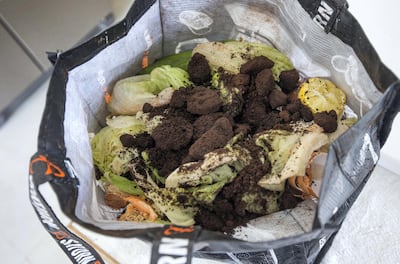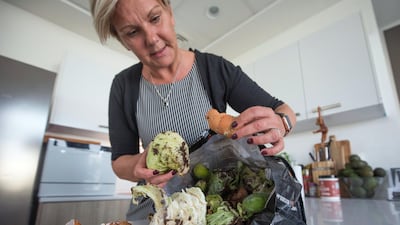Gardeners across the UAE are turning their private gardens into public composting sites in an effort to help cut food waste.
Green-fingered backers of a global project are inviting residents in the Emirates to drop off their food scraps so they can be turned into plant feed.
Fruit, vegetables, eggshells, coffee grounds and stale bread can all be collected and broken down over time into valuable fertiliser.
The compost is then distributed by community groups to help grow vegetables and flowers.
“News of the initiative has spread organically and online registrations in the UAE have picked up," said Sunny Sangha, community manager of MakeSoil.org
"[It] seems to be gaining momentum as neighbours here want to collaborate to address the food-waste crisis.
"The first Abu Dhabi soil site already has 10 [registered] supporters, which may be the fastest growth of any soil site in the MakeSoil.org movement so far."
MakeSoil.org, an online platform, was started in the United States last year with thegoal of helping to "regenerate the planet".
Organisers hope that those signing up to the initiative will "reconnect with the Earth and each other".
The project works by inviting eco-conscious residents to allow their homes to become collecting sites for community food waste.
These "soil makers" then appeal to local "soil supporters" to drop off their food waste so it can be made into compost.

So far in the Emirates, homes in Dubai, Abu Dhabi and Sharjah have all agreed to act as collecting sites.
In Dubai, there are six sites listed – two in the Springs community, and more in Al Warqa, Al Barari, Arabian Ranches and Dubai Marina.
Dubai resident Doua Benhida, 29, told The National that she signed up to the initiative as a soil supporter.
“I try to make compost at home but I travel a lot which makes upkeep and maintenance difficult,” she said.
“I’m an advocate of zero waste and I host a lot of talks in the UAE about making it a lifestyle choice.
“One of the most common questions people ask me is where they can dump their food scraps in Dubai. Now, I can finally answer that question.”
Roughly one third of the food produced around the world for human consumption is currently wasted annually, according to the United Nations.
In the UAE, the Ministry of Climate Change and Environment estimates that food waste costs the country an average of Dh13 billion a year, while an average person is responsible for 2.7kg of food and packaging waste per day.
The Emirates has pledged to cut waste by 50 per cent by 2030 to meet the UN's Sustainable Development Goals.
Abu Dhabi resident Sarah McFayden said she had also signed up to be a soil supporter.
Despite her apartment block providing separate food waste bins on each floor, she said she was sceptical of where the produce ends up.
“I’m never quite sure if it ends up in landfill or not, so at least this way I can track its whereabouts as I’ll be delivering the scraps to the composting spot myself,” she said.
Ms McFayden said she had joined the soil site in Al Mushrif, next to her office, and planned to drop off her food scraps daily.
“I did look to do my own composting at home but there is limited access to the kind of equipment you need here, like specialised bins and compost-accelerator powder,” she said.
"It can be quite expensive to compost at home too, so for now, until I am more committed to doing it myself, this is a great alternative.”


